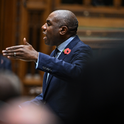Now that the creation of a largely elected House of Lords seems likely, the location of this new parliamentary chamber ought to be a matter for debate. And the case for locating it in one of England's regional cities should be considered.
As a Londoner who delights in the capital's dynamism and diversity, I nonetheless agree with Ken Livingstone in his interview in this magazine that London hosts too great a share of our national public institutions. More of them should, where sensible, be located in other cities, particularly new or reformed institutions which involve new facilities. This would be the case with an elected second chamber in place of today's part-time house, which has peers sharing several to a room with few support staff.
Virtually no other large state in the world concentrates as much political, economic and cultural power in its capital city as does Britain. Even Paris is less economically dominant than London and its hinterland. And whereas Cardiff, Edinburgh and Belfast have gained—or are gaining—their own devolved institutions, with the cultural and economic benefits accruing, the regional cities of England have gained little from devolution and other constitutional reforms since 1997.
When reformers talk of "decentralising power," they mostly take it for granted that all Britain's central political institutions will remain in London. Virtually no consideration was given, for example, to locating the new supreme court outside London. I recall only one ministerial conversation on the subject while I was in No 10; the idea was swiftly dismissed on the grounds—I paraphrase—that it was unlikely to be well received by the judges and barristers who reside in London.

So there is a strong case for locating the elected lords in one of England's great regional cities. This would symbolise and promote a redistribution of political power not only beyond England but also within England, and if the location were to be in the midlands or the north, it would help counter the north-south divide. Manchester or Birmingham—the strongest of the obvious contenders—would be closer to the constituencies and homes of most of those elected as members of the new chamber. It would be barely two hours from London for joint events or meetings in the House of Commons, although as a member of the House of Lords I am struck by how much the two keep themselves apart. Even the much-vaunted "ping pong" of legislation between the two houses involves no joint meetings or consultations, but simply the ceremonial carrying of a manuscript copy of the bill in dispute from one house to the other by a bewigged clerk, a function which could no doubt be conducted by email in the modern age.
What of the practical argument against relocation, in terms of the servicing of the elected lords by ministers and civil servants, and the cost?
Of the 93 ministers who comprise the government, only 14 are members of the Lords, and all but two of them junior ministers who do not attend cabinet and only intermittently cabinet committees. As one of those junior ministers, I would see no difficulty in operating from Manchester or Birmingham. The parliamentary work would be the same. Meetings with MPs and ministerial colleagues within and beyond my department could be comfortably accomplished during one day a week in London, with some meetings replaced by phone calls or video conferencing. MPs and London-based ministers could travel to the second chamber on occasion.
In some respects, having a dozen or so ministers located outside London would be positively advantageous. As schools minister, I frequently visit the midlands and the north; but London and the southeast loom larger, and it would be a good thing for there to be a group of public service ministers, in particular, whose offices are outside London.
As for civil servants, with the large-scale relocation of departmental and agency staff from the capital, Manchester or Birmingham are closer than London for a growing proportion of senior officials and agency executives. My education department now has more staff in Darlington, Sheffield and Runcorn than in London, while one of our principal agencies is relocating from Green Park to Coventry.
As for cost, the present House of Lords has been buying up buildings near parliament in order to provide basic—but still inadequate—facilities for its members, all of which would be redundant and saleable at high prices if the reformed second chamber were outside London. If it did not relocate, there would be a need to buy or build still more property in one of England's most expensive neighbourhoods. And vacating its office space within the Palace of Westminster could enable other appropriate state institutions to fill the space—for example, the supreme court, which would not then need its expensive new home in Middlesex Guildhall on Parliament Square.
What of the existing chamber of the House of Lords? Pugin's masterpiece, with its golden throne and heraldic emblems, would continue to be the setting for the annual state opening of parliament, pomp and circumstance intact, including perhaps the appearance of the peers of the realm in full ermine once a year to demonstrate that British genius for entwining tradition and modernity. For the rest of the year, the chamber would make a splendid centrepiece for a much-needed visitors' centre for parliament, opening the Palace of Westminster properly to the public for the first time.
And my immediate thought for the most suitable location for the elected lords? How about a waterside venue within the new Salford Quays development in Manchester, next to the Lowry and the proposed BBC centre (another welcome relocation of a state institution from London)? The elected lords would then have a large part of the BBC to themselves. What a privilege.











